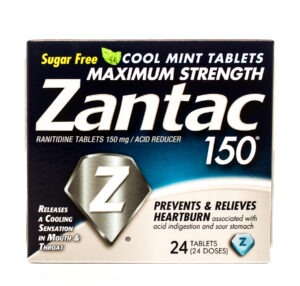
The medication has since been widely recalled, causing serious concern for the 15 million Americans who take the medication as a prescription and the many millions more who regularly take over-the-counter Zantac and its generic equivalents.
This has led to investigations into those who have taken the drug, any potentially related cancer diagnoses, and if anything can be done to get compensation for those who were unfairly injured by the drug company’s negligence.
What is Zantac, also known as Ranitidine?
Zantac is a popular heartburn medication whose generic form is known as ranitidine. Zantac works as an H2 blocker that decreases stomach acid in those suffering from heartburn. It is commonly used in short increments, usually 14 days, to relieve heartburn symptoms, as well as other issues like ulcers, gastroesophageal reflux disease, and similar conditions.
Ranitidine is the generic name of the H2 blocker. According to MedicineNet, it is more commonly sold under the drug names: Zantac, Zantac Maximum Strength, Wal-Zan, Heartburn Relief (ranitidine), Acid Control (ranitidine), and Acid Reducer (ranitidine).


Expect More, Receive More: Legal Support That Feels Like Family
Why Were Lawsuits Filed against Zantac?
The issue was first brought to light when an online pharmacy notified the Food and Drug Administration (FDA) that it had found “extremely high levels” of a possible cancer causing chemical known as NDMA. They found NDMA is every single ranitidine drug these tested, including off brands and Zantac.
According to the online pharmacy who tested the drug, Valisure, an instability in ranitidine can cause it to react with itself to produce NDMA when ingested.
Their tests found that a single tablet of the heartburn medication contained more than 31,000 times the FDA’s maximum daily intake limit of NDMA.
After reporting this information to the FDA, the drug regulation administration announced that their own tests had revealed similar results.
This information led to allegations that the makers of the heartburn medication were aware of the problem and failed to warn the public of the risks, including cancer.
Does Zantac Cause Cancer?

NDMA is a known possible carcinogen and is listed by the International Agency for Research on Cancer (IARC) and the US National Toxicology Program (NTP) as so. In fact, researchers commonly use NDMA to induce cancer in rats when performing cancer treatment testing.
NDMA exposure has been strongly linked with stomach cancer, intestinal cancer, and liver cancer among others. It has been more limitedly linked to prostate cancer, pancreatic cancer, leukemia, and Non-Hodgkin’s Lymphoma, among others.
Despite all this information, more testing is required to be sure of any correlation between Zantac and NDMA and its possibility of causing cancer.
One telling fact is that manufacturers and distributors have started massive voluntary recalls. More about the recalls can be found below.
Complications and Symptoms from NDMA and Zantac
NDMA, aside from being a cancer causing chemical, is also a potent hepatotoxin, which means that it causes damage to the liver, both from short-term exposure and long-term exposure.
Symptoms from high levels of exposure to NDMA can cause:
- Headache
- Fever
- Nausea
- Jaundice
- Vomiting
- Abdominal cramps
- Enlarged liver
- Dizziness
- Reduced function of the liver, kidneys, or lungs
Additionally, some symptoms that have been associated with taking Zantac include:
- Vitamin B-12 deficiency
- Nervous system disorders
- Irregular or rapid heartbeat
- Hepatitis
- Liver failure
- Risk of pneumonia
- Among others, found here
Complete a Free Case Evaluation form now
Zantac and Other Ranitidine Products Recalled
In October 2019, the maker of Zantac, Sanofi, voluntarily recalled all over-the-counter Zantac medications. Additionally, generic forms of the drug had also been recalled.
Here is a full list of recalled ranitidine products. Click on the FDA source link for specific lot information.
- Precision Dose recalls ranitidine oral solution, USP 150 mg/10 ml. (FDA source)
- Golden State Medical Supply recalls ranitidine HCl 150mg and 300mg capsules. (FDA source)
- Amneal Pharmaceuticals recalls ranitidine tablets 150 mg and 300 mg, and ranitidine oral solution, USP 15 mg/ml. (FDA source)
- American Health Packaging recalls ranitidine liquid unit dose cups. (FDA source)
- Aurobindo and DG Health recall their ranitidine products. (FDA source)
- Novitium Pharma recalls ranitidine HCl capsules, 150 mg and 300 mg. (FDA source)
- Lannett Company Inc. recalls ranitidine oral solution, USP 15mg/ml. (FDA source)
- Kroger, Walgreens, Dr. Reddy’s recall their brands of ranitidine tablets and capsules. (FDA source)
- Perrigo Company recalls all ranitidine products they produce. (FDA source)
- Sanofi, maker of Zantac, recalls all Zantac OTC products in the U.S. (FDA source)
- Apotex Corporation recalls 75mg and 150mg ranitidine tablets. (FDA source)
- Sandoz Inc. recalls ranitidine HCl capsules. (FDA source)
Did the Drug Companies Know about Zantac’s Carcinogenic Risks?
Ranitidine has been studied for harmful properties since it was released for public consumption in the 1980s. Since then, many of the studies ignored NDMA contaminates or did not know what they were looking for. However, others have claimed that multiple manufacturers of ranitidine products knew that high levels of NDMA existed when their drug was combined with drinking water in the stomach.
Lawyers who have been filing lawsuits related to Zantac causing cancer have noted that the manufacturers, Sanofi and Boehringer, knew of studies that showed high levels of NDMA in Zantac and failed to warn the public.
Filed in U.S. District Court, one lawsuit stated that “had [the manufacturers] disclosed that Zantac results in unsafe levels of NDMA in the human body, no person, let alone a reasonable person, would have purchased and consumed Zantac.”
The FDA and European Commission have said that they will continue to investigate Zantac and ranitidine for NDMA.
Should I Stop Taking Ranitidine?
The short answer is: you should always consult your physician before stopping or starting any medication. That is sound advice, all around.
And it should be noted that, at this time, the FDA has not called for the public to stop taking Zantac or other ranitidine products.
But, it should be said that Zantac is not a medication that anyone should take for a long period of time. The drug is intended as a short-term solution to heartburn, so if you have been taking it for longer than the package recommends, you should talk to your doctor about stopping the medication and finding a new method for heartburn relief.
There are plenty of other drugs, or different H2 blockers that don’t create unsafe levels of NDMA, which can be helpful in treating heartburn. Likewise, other habits and practices can reduce heartburn, like avoiding certain foods, beverages, spicy foods, fatty foods, and alcohol.
Are We Talking About a Class Action Lawsuit?
Some class action lawsuits have been filed against Zantac, but those aim to just get participants money back for purchasing the drug. These class lawsuits are not seeking damages for injuries or illnesses caused by the drug.
If you were injured by Zantac or believe that your cancer was caused by the medication, contact an attorney individually to handle your case.
What Damages Can I Recover from a Lawsuit?
If Zantac caused you harm or illness, you may be able to recover the following damages:
- Past and future medical expenses caused by the injury
- Pain and suffering, both mental physical and mental, caused by the drug and its ramifications
- Lost wages while recovering
- Lost earning capacity in the future
- Loss of enjoyment of life
- Punitive damages, if the court deems them appropriate
If you believe you lost a loved one due to Zantac-related illness, and your case is successful, you could recover wrongful death damages, like funeral expenses, loss of expected earnings, and loss of companionship.
Do I qualify for a Zantac Cancer Lawsuit or Settlement?
In order to qualify for any defective medication lawsuit, you must first prove that you actually took the mediation. For prescription strength ranitidine, you can easily get this info from your pharmacy. If you purchased it over the counter, it will be more difficult to prove, but it is definitely still possible through receipts, medical records, and/or corroborating evidence, like medical tests that show it in your system.
Next, you must prove that you were injured. This is done quite simply with medical records and statements from your healthcare providers.
Finally, you must prove that the two are related. Meaning that your taking of Zantac and your injury are related. Basically, you must prove that your injuries were directly caused by Zantac. This can be a little tricky, which is why it is necessary to employ the services of a trained personal injury attorney who has access to medical professionals, expert witnesses, and extended resources.
Contact an Experienced Defective Medication Attorney Today
If you believe that you were injured, or acquired cancer, due to long-term exposure to Zantac, then you may be entitled to compensation for your expenses and other damages. Likewise, if your loved one passed away due to illness caused by Zantac, you may also have a case.
Contact the attorneys at Viles & Beckman today to schedule a free consultation directly with a personal injury attorney. We will be happy to answer all your questions and inform you of your rights. There is no obligation and no cost. Contact us at (239) 334-3933 or by filling out our online form.
About the Author of this Page: The above information was written or reviewed by one of the attorneys at Viles & Beckman LLC who have a combined experience of nearly 60 years: Marcus Viles, Michael Beckman. The information provided in this article comes from years of experience trying legal cases outside and inside courtrooms throughout Florida along with extensive research.
Call or text (239) 334-3933 or complete a Free Case Evaluation form






